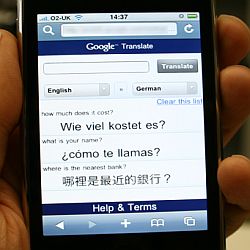Google pulls the rug out from under web service API developers, nixes Google Translate and 17 others


The Google Translate API has been officially deprecated as of May 26, 2011. Due to the substantial economic burden caused by extensive abuse, the number of requests you may make per day will be limited and the API will be shut off completely on December 1, 2011.
When asked what exactly constituted "extensive abuse" a Google spokesperson said that the company has "no more detail to share" on the matter.
In the Google Code blog, Adam Feldman (Product manager for Google APIs) mentioned Google Translate in a list of 18 web services used by Ajax and mobile app developers that would be going away. He wrote:
As the web evolves and priorities change, we sometimes deprecate APIs – that is, remove them from active development – to free up resources and concentrate on moving forward. Today we're announcing a spring cleaning for some of our APIs.
Except for Google Translate, all the deprecated services will continue to work for their "standard deprecation period", which is normally 3 years. A few were replaced with better APIs, but most will simply be dropped.
Updated: Feldman has posted an update to the Google Code blog saying the Translate API will continue as some sort of paid service. He writes:
UPDATE June 3: In the days since we announced the deprecation of the Translate API, we’ve seen the passion and interest expressed by so many of you, through comments here (believe me, we read every one of them) and elsewhere. I’m happy to share that we’re working hard to address your concerns, and will be releasing an updated plan to offer a paid version of the Translate API. Please stay tuned; we’ll post a full update as soon as possible.
After the break, you can find a complete list of the APIs affected by Google's "spring cleaning".
Continue reading: Deprecated and discontinued APIs >
What do you think of Google's move? Participate in the discussion
First, the following 7 services are deprecated immediately (which means new applications should not be written to use them) but Google has not said when or if they will remove the functionality for existing users:
In addition, 11 more services are scheduled for shutdown. Google says they will keep them running for up to 3 years, except of course for Google Translate:
- Blog Search API
- Books GData API - replaced by a new Books API
- Books JavaScript API - replaced by a new Books API
- Image Search API
- News Search API
- Patent Search API
- Safe Browsing API version 1 - replaced by a new Lookup API
- Translate API - deprecated now, shut down December 1st
- Transliterate API
- Video Search API
- Virtual Keyboard API
The shutdown of the Google Translate API will kill what has become a cottage industry of iPhone, Android, and other mobile phone and web apps that embed translation services, such as SMS programs that send messages in the recipient's language. I have published two of them myself on the Android Market. Mine grew out of a sample I wrote for "Hello, Android" that teaches Android developers how to call web services on a background thread. The source code for that sample is available here in the Translate project.
Google says it will continue to support the Translate Web Element, which is a JavaScript snippet you can add to a web site to enable a translation button for the whole page or section of a page. Because of their nature, however, web elements cannot be used in applications or mashups, so they are no substitute for a real web service API.
A quick search of the Android Market shows over 600 apps that could be rendered non-functional in a few months because of this change. The number of apps in Apple's iPhone app store that used the service is probably similar, not to mention numerous web sites, mashups, toolbars, and web browsers that depend on it. Naturally, Google's own branded sites and programs will not be affected - just third party software.
Google Translate is one of an all-too-rare breed of computer technologies that can enrich the lives of ordinary people all over the world regardless of their wealth or status. The real-world applications are enormous, ranging from the personal (helping people make friends in different countries) to the politic (reading an unfiltered version of what government are saying to their own people in state-sponsored media).
By making this service available for free, and encouraging developers to incorporate its API into their applications, Google did more than anyone since Gorbachev to tear down the walls that separate us. They also built for themselves a tremendous amount of goodwill, both for their technical achievements and service for the betterment of mankind. Competitors such as Microsoft will try to fill the gap, but somehow I don't think it will be quite the same.
Updated: Feldman has posted an update to the Google Code blog saying the Translate API will continue as some sort of paid service. Google still refuses to answer questions about the change.
What do you think of Google's move? Participate in the discussion